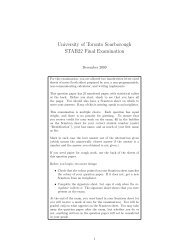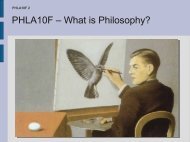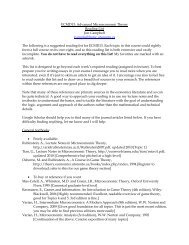The Problem of Induction
The Problem of Induction
The Problem of Induction
You also want an ePaper? Increase the reach of your titles
YUMPU automatically turns print PDFs into web optimized ePapers that Google loves.
PHLA10 12<strong>The</strong> <strong>Problem</strong> <strong>of</strong> <strong>Induction</strong>
PHLA10 12<strong>The</strong> <strong>Problem</strong> <strong>of</strong> <strong>Induction</strong>●●Knowledge versus mere justified belief– Knowledge implies truth– Justified belief does not imply truth– Knowledge implies the impossibility <strong>of</strong> error– Justified belief does not imply impossibility <strong>of</strong> errorJustified belief comes in grades <strong>of</strong> more or less– You are more justified in believing you will lose the 649lottery than in believing this coin will come up heads– We <strong>of</strong>ten express this ‘gradation’ in terms <strong>of</strong>probability– <strong>The</strong> concept <strong>of</strong> evidence can be expressed in terms <strong>of</strong>probability too● P is evidence in favour <strong>of</strong> Q = P raises theprobability <strong>of</strong> Q– Learning you rolled an even number is (some)evidence in favour <strong>of</strong> you having rolled a six
PHLA10 12<strong>The</strong> <strong>Problem</strong> <strong>of</strong> <strong>Induction</strong>●●Ordinary skepticism attacks knowledge– Claims that we have no (or almost no) knowledge– Does not deny that some beliefs are more reasonablethan others ...– Does not deny that some beliefs are evidence forothers (e.g. raises their probability)Justified belief skepticism attacks rationality– Claims that we have no reason to think that any beliefis either more or less probable than any other– Denies we have any good reason to think that anybelief is evidence in favour <strong>of</strong> (or against) any otherpossible belief– (A priori beliefs/probabilities may be an exception)
PHLA10 12<strong>The</strong> <strong>Problem</strong> <strong>of</strong> <strong>Induction</strong>●Review: what is induction– A method <strong>of</strong> ‘amplifying’ or adding knowledge (or atleast adding to our stock <strong>of</strong> beliefs)– Unlike in a valid deductive argument, the conclusion <strong>of</strong>an inductive argument is not guaranteed to be true,even if the premises are true● example: (1) Most dogs are pets (2) Fido is a dog (3)therefore, Fido is a pet– Recall what makes a good inductive argument● good sample size● good sample distribution (sample must berepresentative <strong>of</strong> total)● <strong>The</strong>se requirements assume there are better orworse evidential relations
PHLA10 12<strong>The</strong> <strong>Problem</strong> <strong>of</strong> <strong>Induction</strong>●●●●●●Two (closely related) forms <strong>of</strong> induction(1) Generalization (GEN)– example: All observed mammals have hair; thereforeall mammals have hair.(2) Prediction (PRED)– example: All observed reptiles are cold blooded;therefore the next reptile to be observed will be coldblooded.Obviously (GEN) and (PRED) are not deductively validargument forms.But it seems intuitively obvious that the premises give usa good reason to believe the conclusionHume argues that this intuition is unsupportable andwrong
PHLA10 12<strong>The</strong> <strong>Problem</strong> <strong>of</strong> <strong>Induction</strong>●Hume’s version– Hume believed that all inductivearguments involved one crucialassumption: the Principle <strong>of</strong> theUniformity <strong>of</strong> Nature (PUN).– PUN = nature will continue tobehave in the future as it has inthe past / nature will generally besimilar to the way it is around hereDavid Hume (1711-1776)
PHLA10 12<strong>The</strong> <strong>Problem</strong> <strong>of</strong> <strong>Induction</strong>●How does PUN fit into inductive arguments?– Instead <strong>of</strong>● All thus far observed mammals have hair, so the nextmammal we meet will have hair– We have● All thus far observed mammals have hair and PUN, sothe next mammal we meet will have hair– Does PUN turn an inductive argument into a deductiveargument?– Perhaps it is meant to.– But what kind <strong>of</strong> proposition is PUN?● A priori (can be deductively proven)?● A posteriori (can only be inductively proven)?
PHLA10 12<strong>The</strong> <strong>Problem</strong> <strong>of</strong> <strong>Induction</strong>●●●Is PUN a priori?– Can we give a deductive pro<strong>of</strong> <strong>of</strong> PUN?– Is it possible that nature should not be uniform?– It seems possible– <strong>The</strong>refore, PUN is not a priori<strong>The</strong>refore, PUN is a posteriori– So it must be proven either by observation or induction– We cannot observe PUN (because it is about the future)– So we must give an inductive argument for PUNWhatever this argument might look like it will be aninductive argument.– <strong>The</strong>refore, the argument will contain an assumption– <strong>The</strong> assumption – according to Hume – will be PUN– This is circular reasoning and cannot show PUN
PHLA10 12<strong>The</strong> <strong>Problem</strong> <strong>of</strong> <strong>Induction</strong>●●●●Example argument:– In the past, PUN has always been true– <strong>The</strong>refore (inductively) PUN is trueHume notes that this argument depends on the assumptionthat nature will continue to obey PUNSo the argument ought to be:– In the past, PUN has always been true– PUN– <strong>The</strong>refore, PUN is trueThis argument fails because it blatantly assumes what itwants to prove!
PHLA10 12<strong>The</strong> <strong>Problem</strong> <strong>of</strong> <strong>Induction</strong>●Hume’s attitude towards induction– Hume thought we should reason inductively even thoughwe have no rational reason to do so– He thought we (and many other animals) are naturallystructured to believe in and use induction● Example: Pavlov’s dogs– Hume sometimes called this ‘habit’– He also noticed instincts – which are ‘built in’ by natureand carry information about how organisms ‘expect’ theworld to work– Hume wondered how instincts arose and camesomewhat close to a concept <strong>of</strong> evolution– But rationality cannot support the beliefs derived byinstinct or by the habit <strong>of</strong> inductive inference
PHLA10 12<strong>The</strong> <strong>Problem</strong> <strong>of</strong> <strong>Induction</strong>●●●But is PUN needed for inductivearguments or the attack oninduction?What, exactly, is the content <strong>of</strong>PUN?Is nature always ‘uniform’?– Do the seasons <strong>of</strong> the yearshow uniformity or diversity?– Is the death <strong>of</strong> animals afeature <strong>of</strong> natural uniformity ora sudden dis-uniformity in ananimal’s life– It seems impossible to state PUN in any non-trivial way– But PUN is not needed to create the problem <strong>of</strong>induction
PHLA10 12<strong>The</strong> <strong>Problem</strong> <strong>of</strong> <strong>Induction</strong>●<strong>Induction</strong> and reliability– We want our inductive knowledge to be secure– Let’s say that a reliable method <strong>of</strong> inference is one thatusually leads to the truth● ‘usually’ can be thought <strong>of</strong> as a scale, from the notvery reliable to the highly reliable– examples: prediction <strong>of</strong> solar eclipses (highlyreliable) to weather prediction (not highly rel.)● This scale can be expressed in terms <strong>of</strong> probability– <strong>The</strong> probability <strong>of</strong> an eclipse given what we knowabout Sun, Earth and Moon is virtually 1– <strong>The</strong> probability <strong>of</strong> rain next week given ourcurrent knowledge is slightly more than ½– Sober’s version <strong>of</strong> the problem <strong>of</strong> induction● How do we know that induction in general is areliable way to get knowledge?
PHLA10 12<strong>The</strong> <strong>Problem</strong> <strong>of</strong> <strong>Induction</strong>●Sober’s new version <strong>of</strong> the problem <strong>of</strong> induction– How do we know that induction in general is a reliableway to get knowledge?– Now we replay Hume’s point– Either we can deductively prove that induction is areliable way to get knowledge, or– We have to inductively prove it is reliable– <strong>The</strong>re is no way to prove deductively that induction isreliable (because we can consistently imagineinduction failing)– But to prove that induction is reliable inductively is toargue in a circle– PUN plays no part in this argument
PHLA10 12<strong>The</strong> <strong>Problem</strong> <strong>of</strong> <strong>Induction</strong>●Sober’s version <strong>of</strong> the problem <strong>of</strong> induction– Think about what this means– We have zero reason to think that induction is reliable– This implies that we have no reason to believe what isinductively reasonable versus the opposite– Example: we have zero reason to believe that the Sunwill rise tomorrow – it is exactly as reasonable tobelieve it will not rise as that it will ?!– How can that be right?– Can we save induction?
PHLA10 12<strong>The</strong> <strong>Problem</strong> <strong>of</strong> <strong>Induction</strong>●Strawson’s attempt to save induction– Maybe it is an analytic truth that inductionis a rational way to amplify knowledge– (Recall what an analytic truth is)– Strawson seems to be claiming that theidea that induction is a good way to reasonis part <strong>of</strong> the concept <strong>of</strong> rationality– Suppose that is true– Would this prove that induction is reliable?– It would seem notSir Peter Strawson(1919-2006)
PHLA10 12<strong>The</strong> <strong>Problem</strong> <strong>of</strong> <strong>Induction</strong>●Black’s attempt to save induction– Recall the argument in favour <strong>of</strong> induction:● <strong>Induction</strong> has been successful in thepast, so it will be successful in the future– Is the argument in favour <strong>of</strong> induction reallycircular?– Note the difference between a premise <strong>of</strong>an argument and a rule <strong>of</strong> inference– Black argues that an argument is circularjust in case the conclusion appears (maybeonly implicitly) among the premises– On that understanding, the inductiveargument in favour <strong>of</strong> induction is notcircular– it just uses the inductive rule <strong>of</strong> inference Max Black(1909-88)
PHLA10 12<strong>The</strong> <strong>Problem</strong> <strong>of</strong> <strong>Induction</strong>●Achilles and the Tortoise (logical version)– A has an argument: P, P implies Q, thus Q– T says: well that might be OK, but I’m notsure about the final step– T says: are you sure you don’t need an extrapremise, like: if P and (P implies Q) then Q– A’s new argument: P, P implies Q, If P and (Pimplies Q) then Q, thus Q– T says: well that might be OK, but I’m notsure about the final step– T says: are you sure you don’t need an extrapremise, like: if P and (P implies Q) and [if Pand (P implies Q) then Q], then Q– ….
PHLA10 12<strong>The</strong> <strong>Problem</strong> <strong>of</strong> <strong>Induction</strong>●Black’s attempt to save induction– Is Black’s notion <strong>of</strong> circularity right?● Or is there something wrong with an argument thatdefends a form <strong>of</strong> argument which you can accept only ifyou already accept that form <strong>of</strong> argument?– We could also ask Black:● even if we could give this inductive pro<strong>of</strong> <strong>of</strong> induction,would that show that induction is reliable?● No, because counter-induction (CI) is equally supportedby a counter-inductive argument● CI = if X has happened in the past, expect not-X– example: gambler’s fallacy● <strong>The</strong> CI argument in favour <strong>of</strong> CI– CI has failed in the past, so expect it to succeed in thefuture● This is a good CI argument!
PHLA10 12<strong>The</strong> <strong>Problem</strong> <strong>of</strong> <strong>Induction</strong>●●●Sober’s Trip Beyond Foundationalism– Note how Sober divides knowledge claims into 3 levels1) Indubitable beliefs (a priori / introspectible)2) Present and past observations3) Predictions and generalizations– Descartes had problems getting from 1 to 2– Hume adds problems getting from 2 to 3Sober thinks there is no way to– Move deductively from a level to a higher level– Even use lower level stuff as evidence as higher level● That is, IF one is restricted to the lower levelThis is because something is evidence only relative toadditional ‘background beliefs’– Example: phantom limb pain ...
PHLA10 12<strong>The</strong> <strong>Problem</strong> <strong>of</strong> <strong>Induction</strong>●●●<strong>The</strong> relativity <strong>of</strong> evidence– Suppose we have this evidence: we have examined10,000 emeralds and they are all green– Is this evidence for: all emeralds are green– Not if we also believe X: <strong>The</strong>re are many emeralds andthey are 99% green OR all emeralds are green butthere are very few emeralds in the worldNotice that X is not a level 2 statementSober’s thesis: no strictly level n statements justify anylevel n+1 statements– Why? Because <strong>of</strong> the relativity <strong>of</strong> evidence– What if we had no level n+1 beliefs?– <strong>The</strong>n we could say nothing about level n+1 based onlyon level n evidence (except for trivial or a priori truths)– Is that true?
PHLA10 12<strong>The</strong> <strong>Problem</strong> <strong>of</strong> <strong>Induction</strong>●Anti-foundationalism about justification– Is ‘rational justification’ strictly about inter-leveljustification?● If so, Sober thinks it’s impossible to achieve– Or is there a sense <strong>of</strong> ‘rational justification’ that takesinto account our current epistemic position?– That is, could we say something like● Given our current epistemic situation (what webelieve now) evidence E would justify belief P– This assumes an idea <strong>of</strong> ‘shared epistemic situation’– Belief conservatism: if it ain’t broke don’t fix it● Maybe all justification is relative to an epistemicsituation = our current beliefs / world view– So, has induction been justified ???


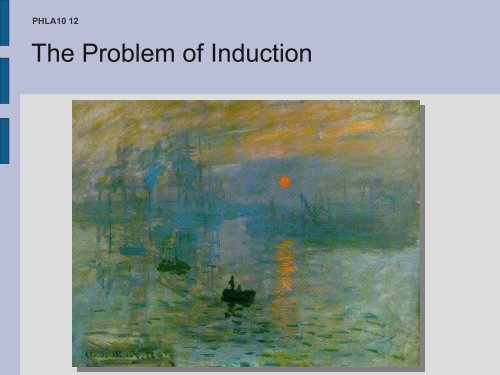
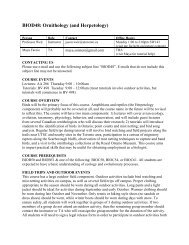
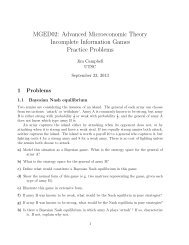
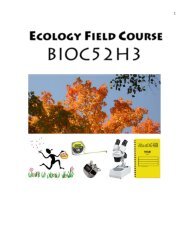
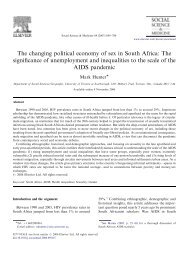

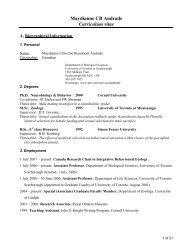
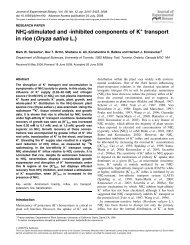
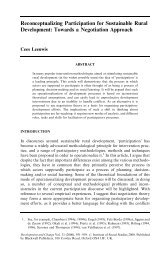
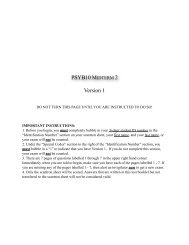
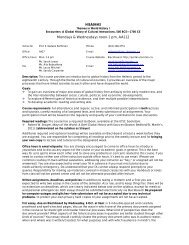
![[Enter course name - Syllabus] - University of Toronto Scarborough](https://img.yumpu.com/50068522/1/190x245/enter-course-name-syllabus-university-of-toronto-scarborough.jpg?quality=85)
